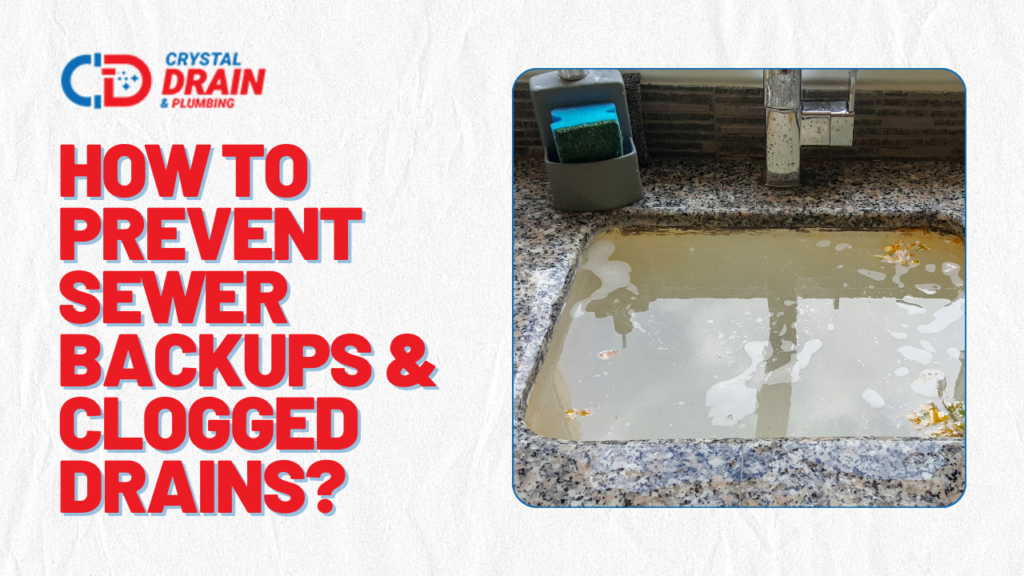How to Prevent Sewer Backups and Clogged Drains During a Storm

Storms can bring heavy rainfall that overwhelms drainage systems, leading to sewer backups and clogged drains. These issues are not only inconvenient but can also cause significant damage to your property. By understanding the signs of a sewer backup, the primary causes, and effective preventive measures, you can protect your home from these costly and unpleasant situations.
Key Takeaways
- Early Signs Are Critical: Watch for gurgling sounds, slow drains, or water backing up in unexpected places to detect sewer issues early.
- Backwater Valves Save Homes: Installing a backwater valve is one of the most effective ways to prevent sewer water from entering your home.
- Tree Roots Pose Hidden Threats: Tree roots can invade sewer lines and cause blockages, especially during heavy rains when the ground is saturated.
- Regular Maintenance Is Key: Frequent inspections of your plumbing and drainage systems can identify vulnerabilities before a storm hits.
- Storm Preparation Reduces Risk: Reducing water usage during heavy rainfall and monitoring weather updates can minimize the chances of backups.
Signs of a Sewer Backup
Multiple Clogged Drains: When more than one drain begins to drain slowly or backs up simultaneously, it’s a telltale sign of a major blockage in the sewer line, rather than isolated issues in individual drains.
Gurgling Sounds: Listen for unusual gurgling sounds coming from your toilets, sinks, or drains. This is often caused by air being trapped and then pushed through the water in your drain traps, indicating a blockage in the sewer system.
Water Backups in Unexpected Places: Running one fixture and seeing water come up another — for example, water emerging in the bathtub when the washing machine drains — is a clear indication of a sewer backup. This cross-connection of plumbing is a serious sign that the main sewer line is obstructed.
Unpleasant Odors: One of the most unpleasant signs of a sewer backup is the presence of foul sewage odors emanating from the drains or any other areas of your home. This is usually due to waste material backing up from the main sewer line.
If you notice these signs, contact a professional immediately. Our emergency services are detailed here.

Primary Causes of Sewer Backups
1. Combined Sewer System Overflows
Older cities like Toronto often use combined sewer systems where stormwater and sewage share the same pipes. Heavy rainfall can overwhelm these systems, leading to sewer backups. Regular maintenance of your home’s drainage and compliance with local guidelines can help mitigate this risk.
2. Tree Root Intrusion
Tree roots are naturally drawn to the moisture in sewer lines. Over time, they can invade pipes, causing blockages and structural damage. Installing root barriers and conducting regular inspections can address this issue.
3. Flushing Non-Degradable Items
Flushing items like wipes, paper towels, or grease down your drains can lead to clogs that worsen during heavy rainfall. Being mindful of what goes down your drains is essential for preventing sewer line obstructions.
Preventive Measures and Maintenance Tips
1. Install a Backwater Valve
A backwater valve prevents sewage from flowing back into your home during heavy rain. It’s a simple yet highly effective solution for minimizing the risk of sewer backups.
2. Regular Inspections and Cleaning
Schedule professional plumbing inspections to check for vulnerabilities in your drainage system. Ensure that backwater valves and sump pumps are functioning correctly before the rainy season.
3. Avoid Clogs with Smart Habits
- Dispose of Waste Properly: Avoid flushing anything other than toilet paper and human waste.
- Monitor Grease Disposal: Pouring grease down the sink can lead to hardened clogs over time.
4. Address Tree Root Issues
If you have trees near your property, consider installing root barriers and periodically inspecting sewer lines for damage. Professionals can remove tree roots without harming your plumbing system.
Additional Tips for Storm Preparation
- Monitor Weather Reports: Stay informed about impending heavy rainfall to prepare in advance.
- Reduce Water Usage: During storms, limit water use in your home to reduce the load on your drainage system.
- Check Outdoor Drains: Clear debris from gutters and outdoor drains to ensure water flows away from your property.
FAQs About Preventing Sewer Backups
A backwater valve is a device installed in your sewer line that prevents sewage from flowing back into your home during heavy rainfall or sewer system overflows.
Yes, installing root barriers and scheduling regular inspections can prevent tree roots from causing damage. If roots have already entered the pipes, professional removal is necessary.
Avoid flushing wipes (even “flushable” ones), feminine hygiene products, paper towels, and grease. Stick to toilet paper and human waste only.
Yes, heavy rainfall can overwhelm sewer systems, especially in older cities with combined sewers. Proper preparation and maintenance can significantly reduce the risk.
If you notice multiple clogged drains, sewage odors, or water backing up into your home, call a plumber immediately to address the issue before it escalates.
